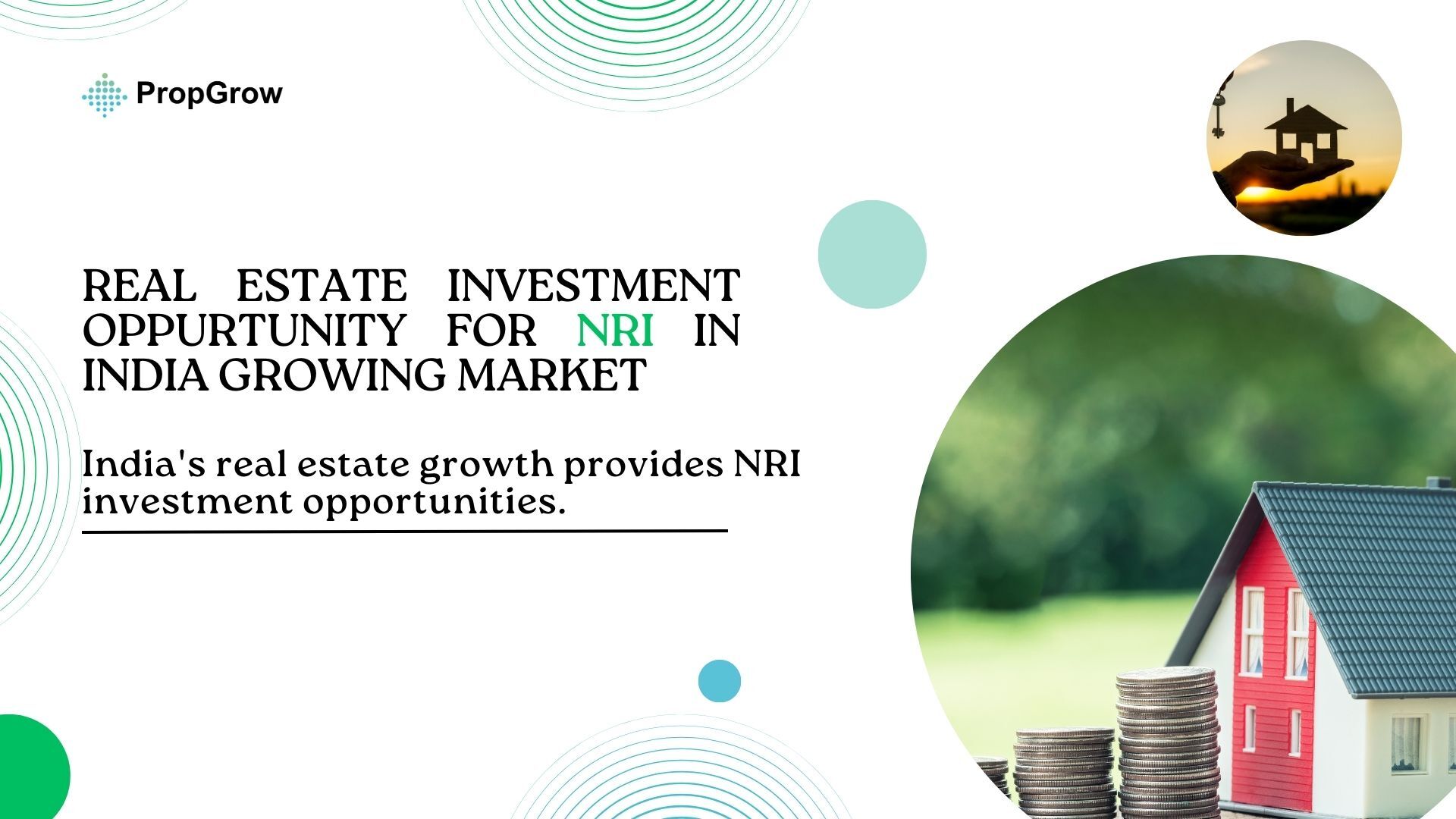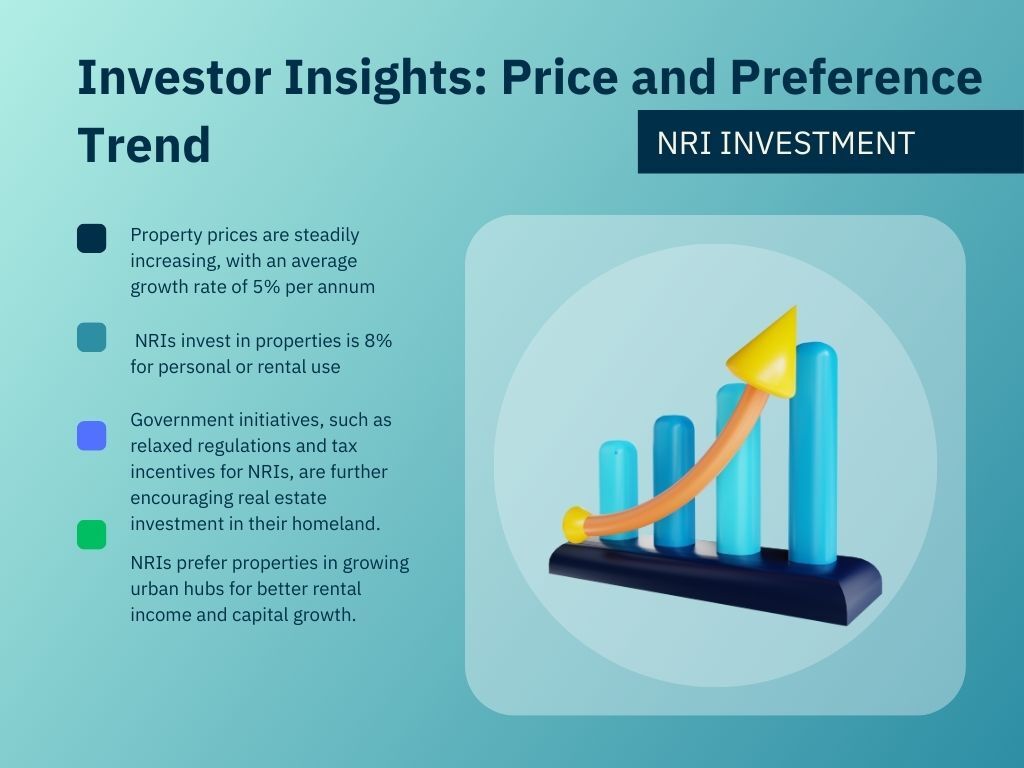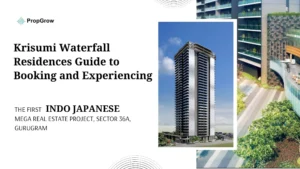
Promising real estate investment opportunities for NRIs in India’s thriving market. Benefit from the stability of the market and India’s fast-growing GDP across various sectors such as manufacturing, services, and IT. Explore lucrative options with a Real estate consultant in Gurgaon
Table of Contents
Introducing investment opportunities for NRI
Investing in Indian real estate has become increasingly attractive for NRI, thanks to the market’s stability. India boasts one of the world’s fastest-growing GDPs, propelled by robust economic growth in sectors such as manufacturing, services, and IT.
The nation’s rapid expansion creates a favourable environment for investments, offering NRIs the opportunity to benefit from capital appreciation.
The growing demand for both residential and commercial properties, driven by this economic expansion, presents a compelling opportunity for non-resident Indians to engage in real estate investment and capitalize on the market’s
NRIs Spark Excitement in the Indian Real Estate Investment Opportunity
In a remarkable turnaround, the Indian real estate market is experiencing a significant resurgence of interest from Non-Resident Indians (NRIs) and investors on a grand scale after a protracted period of dormancy.
The constraints imposed by the pandemic, especially those affecting NRIs unable to reunite with their families in India, have played a monumental role in reigniting their fervour for the real estate sector.

Earlier Challenges, Current Opportunities
Amidst past challenges, Non-Resident Indians (NRIs) and investors have navigated a journey filled with bitter experiences in the Indian property market. Take Snigdha Basu and her husband, who once faced setbacks with an unfinished project by Unitech Ltd.
After years of hesitance towards the Indian property scene, they recently reconsidered. Fueled by the growing demand for properties nearing completion, they ventured into the market again, ultimately securing a successful investment—a charming 3BHK condominium nestled in the vibrant enclave of Picnic Garden, South Kolkata.
Their triumphant tale didn’t end there. Inspired by Snigdha’s positive experience, her cousin and brother eagerly set out on their property quest, signalling a promising revival in the real estate sector.
Strategic Investment Decisions in a Promising Market Landscape
Furthermore, the recent uptick in property values has unveiled a prime moment for savvy investors to delve into strategic investment ventures, a sentiment echoed by Ms Basu, a seasoned banking expert.
Following this trend, her cousin, Chandrima Chowdhury, swiftly seized an opportunity by securing an apartment in a project slated for completion within the year.
These instances highlight a growing inclination towards targeted investments in properties nearing finalization, signalling a notable transformation in market dynamics.
Varied Investor Profiles and Worldwide Impact
The Reawakening of the real estate industry has cast a wide net, captivating not just NRIs, but also drawing the attention of global investors hailing from diverse backgrounds.
Executives from corporate and financial sectors, medical professionals, entrepreneurs, and technocrats spanning West Asia, South-East Asia, the US, the UK, Europe, and even business dynasties from Africa, are actively immersing themselves in the Indian real estate market.
This eclectic surge of investments encompasses premium apartments, plots, villas, and residences in retirement communities, showcasing a vibrant market sentiment.
This resurgence not only mirrors the evolving landscape of the Indian real estate sector but also underscores the growing confidence and enthusiasm among NRIs and global investors in the market’s potential for lucrative ventures.
Booming NRI Engagement Sparks Vibrancy in Indian Real Estate
Recent data from proptech firm NoBroker paints an exciting picture of the Indian real estate market, highlighting a remarkable uptick in the involvement of Non-Resident Indians (NRIs).
Before 2020, NRIs accounted for less than 10% of annual home sales, but in 2023, their contribution surged to 15%. Analysts anticipate this figure to climb even higher, reaching 20% by 2025.
This surge underscores a noteworthy transformation in market dynamics, as NRI investors demonstrate a newfound faith in the residential segment.
Renewed Investor Zeal: Embracing Confidence
Amidst a notable surge in residential market activity, home prices are on a steady ascent. Investors, particularly in the vibrant National Capital Region (NCR), are making a robust comeback.
This resurgence in investor confidence signals the rekindling of interest among a discerning NRI investor base.
Shveta Jain, Managing Director of Residential Services at esteemed property advisory firm Savills India, highlights the current uptick in NRI engagement.”
Prioritizing Thoughtful Investment Decisions
In light of past investment hurdles, NRIs are exercising caution and channelling their investments towards developers with a proven track record. These developers have consistently met project deadlines and upheld their promises to buyers.
According to Jain, NRIs are targeting developers whose projects promise significant potential for capital appreciation. The primary goal for NRI investors remains to secure investments with growth prospects, particularly amid the current scenario of low rental yields.
This resurgence in NRI involvement underscores the shifting landscape of the Indian real estate market.
As NRIs meticulously weigh their investment choices, developers with a demonstrated history of project delivery and performance stand to attract increased interest from this discerning investor cohort.
Unlocking NRI Investment Potential (DLF Innovation Story)
In the dynamic realm of real estate, DLF Ltd, India’s foremost developer, has made remarkable progress in attracting Non-Resident Indian (NRI) investors to its prestigious projects.
The debut of their latest venture, ‘Pravana South’ in Gurugram, saw an impressive 25% ownership by NRIs from diverse global locales, marking a strategic shift in investor involvement.
NRI Investment Boom
The surge of NRI interest in DLF’s ventures can be attributed to the developer’s proactive NRI engagement program, actively connecting with investors, hosting meetings, and offering immediate assistance. Aakash Ohri, Joint Managing Director and Chief
Business Officer at DLF Home Developers Ltd, underscored the significance of trust in DLF, enhanced connectivity, infrastructure, and competitive pricing as pivotal factors propelling NRI interest in their recent projects.
Trust through Strategic Engagement
DLF’s innovative approach in catering to NRI investors involves curating exclusive inventory and orchestrating synchronized project launches across India and abroad.
This proactive strategy has sparked significant interest among NRIs, providing them with premier real estate options and up-to-the-minute updates.
Through this tailored approach, DLF enhances the investment experience, ensuring seamless transactions and unmatched satisfaction for NRI investors.
Outlook Ahead: Future Prospects
DLF’s remarkable success in drawing NRI investors to its upscale projects mirrors a dynamic landscape where strategic engagement, trust, and infrastructure development reign supreme.
As the market undergoes continual transformation, developers are seizing the opportunity to cater to the NRI investor segment with forward-thinking strategies and enhanced customer service.
This trend heralds an exciting era of growth and opportunity for developers and NRI investors alike in the vibrant Indian real estate market.
NRI Interest Soars Across Diverse Regions
Resonating with this pattern, K Raheja Corp Homes in Mumbai has witnessed a notable surge in interest from NRI buyers, particularly those from Dubai and Kuwait. Notably, Hyderabad and Pune have emerged as top choices.
This uptick in NRI engagement underscores the global allure of real estate investment and the enduring appeal of India’s vibrant property markets.
NRI Investment Revelations
It’s remarkable how NRI and domestic investors alike display a spectrum of investment outlooks, spanning short and long-term perspectives.
Experts highlight the current surge of investors, pointing to their substantial financial strength for lasting investments. This trend underscores a resolute belief in the market’s enduring potential.
Investor Insights: Price and Preference Trends
Prashant Thakur, Director and Head of Research at Anarock Group, emphasizes that the current growth in property prices is measured and rational. Concurrently, rental yields are showing an upward trajectory.
NRIs typically acquire properties for personal or rental purposes, often fueled by a sentimental attachment to their roots. This fosters a tight-knit community dynamic, where collective investments and subsequent purchases are influenced by peer decisions.
NRIs’ Rising Interest in Infrastructure-Linked Real Estate
The growing allure of real estate investments among Non-Resident Indians (NRIs) has surged, driven by a blend of emotional and pragmatic motives. Particularly noteworthy is the recent inauguration of the Ram temple in Ayodhya, Uttar Pradesh, which ignited fervour among NRIs.
Mumbai’s esteemed developer, House of Abhinandan Lodha, experienced a remarkable surge in NRI interest in its project, ‘The Sarayu’.
The overwhelming response led to the swift sale of the entire inventory of 250 plots, priced at ₹1.72 crore onwards, within just 24 hours, with NRIs contributing to about 33% of the total participation.
Connections and Strategic Analysis
The magnetic pull of the temple town stirs deep emotional ties, fueling the remarkable surge in NRI interest. Yet, alongside this heartfelt connection, practical considerations come into play.
NRIs are not only drawn by the sacred allure but also closely monitoring the region’s robust infrastructure advancements, anticipating a surge in real estate values.
Abhinandan Lodha, Chairman of the House of Abhinandan Lodha, underscores the escalating NRI involvement in recent years. This reflects their forward-looking perspective, envisioning a prosperous legacy for future generations.
The company’s proactive global outreach has ignited interest from NRIs across 63 countries, affirming the enduring global appeal of real estate investments.
NRIs Venture into Fractional Commercial Real Estate
Traditionally, Non-Resident Indian (NRI) investors have favoured residential real estate projects. However, a significant shift is underway as NRIs venture into fractional investment platforms targeting commercial assets.
These platforms offer investors the opportunity to own a slice of various commercial properties, including offices, warehouses, and luxury holiday homes.
Attractive Returns and Regulatory Influences
In India, residential yields have been relatively modest, typically ranging from 2-3%. In contrast, commercial office spaces offer significantly higher yields, averaging between 7-9%.
Moreover, fractional real estate ownership platforms like Strata present an even more enticing opportunity, boasting a targeted internal rate of return (IRR) of 13-15%, encompassing both rental yield and capital appreciation.
With expectations of regulatory oversight, particularly from the Securities and Exchange Board of India (SEBI), extending to these platforms, both retail investors and NRIs are poised to gain confidence, potentially driving increased participation.
Anticipating SEBI’s consideration to reduce the minimum investment threshold from ₹25 lakh to ₹10 lakh, substantial growth in NRI involvement is forecasted within the next three to five years. According to Nihar Shah, Strata’s assets under management (AUM) are projected to reach ₹2,000 crore by March-end, highlighting robust growth and upcoming asset acquisitions.
Empowered NRI Engagement and Digital Outreach
The advent of fractional commercial real estate platforms has introduced NRIs to a range of diversified investment opportunities, moving beyond traditional residential projects.
As SEBI’s potential regulation looms and a subsequent reduction in minimum investment thresholds is anticipated, it stands poised to further accelerate NRI participation and propel the growth of the commercial real estate investment sector.
NRIs’ Emotional Attachment to Indian Real Estate
The Virtuoso project by Columbia Pacific Communities in Bengaluru has attracted a diverse group of NRI investors.
Among them are corporate and finance executives, doctors, entrepreneurs, and tech professionals from West Asia, Southeast Asia, the US, the UK, Europe, and even business families from Africa. The appeal of luxury homes across India has resonated strongly with these NRIs, reflecting a deep emotional connection to their roots.
NRIs’ Investment Preferences and Financial Trends
A recent survey conducted by NoBroker in November unveiled the primary origins of NRI property buyers, with a significant proportion originating from the UAE and the US. Notably, 37% of these buyers are professionals in the IT/technology sector. Bengaluru emerged as the top choice for property investment, capturing the interest of approximately 29% of NRIs.
The notable capital appreciation observed in the real estate market over the past year has spurred increased interest among NRIs in property investments. Saurabh Garg, co-founder and chief business officer of NoBroker, highlighted, “Around 60% of NRIs are investing in properties valued at ₹80 lakh and above.
Moreover, approximately 40% are acquiring properties for investment purposes, while 60% are making purchases for their families in India or plans.”
This shift in the investment landscape reflects a growing confidence among NRIs, who are leveraging evolving property prices.
The deep emotional connection that NRIs maintain with India is increasingly evident through their investment choices, shaping a dynamic and evolving narrative in the real estate market.
Gurgaon’s Allure: What Makes It More Appealing Than Other Cities
The city exemplifies the advantages of this collaboration reaching critical mass. However, as highlighted by the chaos unleashed last week during the monsoon, Gurgaon also serves as a cautionary tale of the repercussions when the state neglects its responsibility to shape and facilitate such growth
This failure has cast a shadow over the growth narrative of Millennium City since its inception. Created by the Haryana government in 1979, the city witnessed a surge two decades later when General Electric (GE) established an office in 1997, attracting subsequent ventures.
However, this growth occurred in the absence of robust local governance. With no municipal body, the Haryana Urban Development Authority (HUDA) at the state level was tasked with developing connective infrastructure.
This led to a dearth of effective planning, compounded by malfeasance that allowed private developers to push projects through without adequate development plans, contributing to the challenges faced by the city’s development.
Gurgaon’s current state mirrors the challenges at hand. Whether it’s security, electricity, water, or transportation, the private sector is compelled to compensate for the state’s deficiencies. Commercial and residential complexes stand as isolated havens amidst dilapidated urban infrastructure.
The recurrent issue of sewage disposal poses health hazards during instances of flooding, as witnessed recently. Furthermore, the city grapples with negative environmental consequences, exemplified by the reliance on over 30,000 borewells, causing a rapid decline in the water table.
According to a Resource Optimization Initiative study, Gurgaon is projected to have only 48 litres per capita per day by 2020, significantly below the international standard of 130 litres.
While Gurgaon exemplifies the shortcomings in Indian urbanization, it is not an isolated case. Bengaluru faces monsoon-induced chaos, aggravated by inadequate transport infrastructure, while Mumbai’s potential has been stifled by longstanding infrastructure deficiencies and a complex land market.
Gurugram Real Estate: NRI Investment – Balancing Speculation and Opportunity
In the bustling real estate market of NCR’s Gurugram, a resurgence of investor interest, including that of Non-Resident Indians (NRIs), has been palpable. Yet, this surge has raised eyebrows about the resurgence of speculative activities.
During a pivotal earnings call by DLF in January, an analyst probed about investors in the ‘Arbour’ project swiftly offloading their apartments post-launch, resulting in an upswing in secondary sales prices. In response, Ohri allayed concerns, citing that 5-10% of the project’s stock is annually traded, a figure considered well within reasonable limits.
The current market dynamics have carved out a window for short-term profit-making. Savvy investors, particularly those entering at the pre-launch stage, are eyeing potential price escalations over a few quarters, to secure lucrative exits.
However, Amit Bhagat, the astute MD and CEO of ASK Property Fund, offers a contrasting view. He contends that the present market environment isn’t entirely conducive for investors, citing the 5% GST levy on under-construction projects coupled with stamp duty. Such conditions, he observes, are more appealing to end-users, albeit with exceptions for plotted projects.
Despite these challenges, the scarcity of inventory in markets like Gurugram and Noida has reignited the interest of long-term investors, especially NRIs, driven by the fear of missing out on lucrative opportunities.
The pressing question lingers: Can these investors realize substantial compound returns? Initial indicators suggest a positive outlook, with demand displaying remarkable resilience, hinting at promising prospects ahead.
CONCLUSION
The surge of investor activity in Gurugram’s real estate sector, coupled with the notable engagement of NRIs, prompts discussions regarding speculation versus enduring investment opportunities.
Despite occasional concerns about speculative practices, the market outlook remains optimistic, buoyed by sustained demand and the potential for attractive returns, especially for investors adopting a long-term investment approach.
Frequently asked questions
What motivates returnee homebuyers to invest in real estate?
Returnee homebuyers are often motivated by factors such as familiarity with the local market, a desire for stability and security, investment opportunities, and the potential for capital appreciation.
What should return homebuyers consider when choosing a property?
Returnee homebuyers should consider factors such as location, property type, budget, amenities, legal considerations, potential rental income, and long-term investment potential.
How can returnee homebuyers navigate the real estate market effectively?
Returnee homebuyers can navigate the real estate market effectively by conducting thorough research, seeking advice from local experts or real estate agents, and visiting properties in person before making a decision.
What financial considerations should return homebuyers keep in mind?
Returnee homebuyers should consider factors such as exchange rates, financing options, taxes, fees, and potential rental income when making financial decisions about real estate investment.
What challenges might returnee homebuyers face in the real estate market?
Challenges may include unfamiliarity with local laws and regulations, language barriers, cultural differences, market volatility, and competition from other buyers.
How can returnee homebuyers leverage their international experience in real estate investment?
Returnee homebuyers can leverage their international experience by applying their knowledge of real estate trends, negotiation skills, and understanding of different property markets to make informed investment decisions.
What emerging trends are influencing real estate investment among returnee homebuyers?
Emerging trends may include a focus on sustainable properties, interest in smart home technology, and the growing popularity of co-living and co-working spaces.
How do returnee homebuyers contribute to the overall real estate market?
Returnee homebuyers contribute to the real estate market by increasing demand, bringing in new investment capital, and adding diversity to the pool of buyers.
Can you provide examples of successful real estate investments by returnee homebuyers?
Examples may include returnee homebuyers who have achieved significant returns on their investments, found properties that meet their long-term goals, or successfully navigated the challenges of buying property in a new market.





